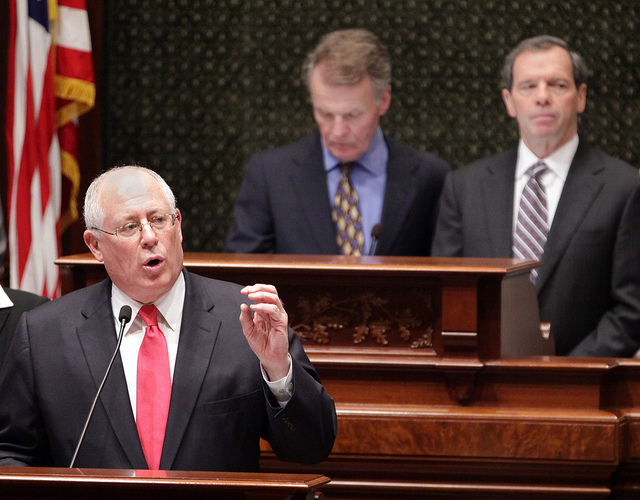With Supermajorities In Both Houses, Illinois Dems Have No One To Blame But Themselves Now
By Chuck Sudo in News on Nov 13, 2012 10:45PM
During our Election Day news roundup last week we noted how Illinois Democrats now have veto proof majorities in both houses of the State Legislature, thanks to deft redistricting, momentum from the Obama re-election campaign, and an Illinois Republican Party that has played the Washington Generals to Illinois Dems’ Harlem Globetrotters for nearly a decade. And it was an historic election: DuPage County, long the spiritual center of Illinois Republicanism, is sending a Democrat to the State Senate for the first time in history
The thought of John Cullerton and especially Michael Madigan having the ability to override Gov. Pat Quinn’s vetoes should give people who follow Illinois politics douche chills. And yet we still hold out a faint glimmer of hope that legislators will return to Springfield and actually reach out across party lines and tackle the pressing issues facing the state, a glimmer that will likely be dashed once the General Assembly is sworn in next January.
Issues like $9 billion in unpaid bills, $203 billion in unfunded pension liabilities, and an 8.8 percent unemployment rate, and ongoing struggles with organized labor. That’s what’s being called Illinois’ “fiscal cliff.”
The first issue of business for Madigan and Cullerton will be making last year’s state income tax hikes permanent. As much as the words “tax hike” leave a filthy taste in Illinoisans mouths, it may be necessary. That’s how bad the state’s financial situation currently stands. The state’s personal income tax rate of 5 percent is expected to drop to 3.75 percent in 2014. If the tax hikes aren’t made permanent, Illinois’ budget deficit could balloon to $9.4 billion by the 2016 fiscal year.
Then there’s pension reform and coming up with a way for the state to handle its obligations. Constitutional Amendment 49—which had Madigan’s fingerprints all over it—failed to gain the required 60 percent of the vote necessary to go into law. It’s back to the drawing board for Madigan, Cullerton and company. Hopefully, they’ll be able craft some plan for pension reform that addresses funding the plans while closing loopholes that allow major political players to double dip and place further strain on the already underfunded system. (We’re looking at you, Rich Daley!)
Quinn has called for a deal on pension reform by Jan. 9, a deadline not expected to be reached. Quinn already took the brunt of criticism for Springfield not reaching a pension reform deal when Madigan summoned the State house in August to kick Derrick Smith out of its chamber.
The veto proof majority also means we may finally see casino expansion in Illinois, which has been rejected twice by Quinn's signaure: this is an example of Quinn’s veto being put to good use. Legislators have touted gambling expansion as a jobs creator, while Quinn said the legislation distracted from the larger issues facing the state and Illinois Gaming Board chairman Aaron Jaffe called it “a pile of garbage.”
The supermajorities in both houses do come with major responsibilities—voters across the state will look to Democrats to get shit done and not argue with each other. But Illinois Republicans shouldn’t sit on the sidelines and let Democrats have their way, as suggested by Illinois Policy Institute CEO John Tillman. State Republicans also face tough questions regarding who will lead them in Springfield. The party has grown more conservative, even as the rest of the nation rebuked the influence of the Tea Party and other fringe conservative groups last week, and those influences could pose challenges to moderate-leaning minority leaders, Rep. Tom Cross and Sen. Christine Radogno. Both Cross and Radogno have shown a willingness to work with Madigan and Cullerton, and hopefully their voices can add to future legislation while curbing the hubris and unchecked power of Madigan, who has now cemented himself as the state’s most powerful Democrat.
The good news is that, with the supermajorities, we may finally see the populist Pat Quinn who started out as an activist, who founded the Citizens Utility Board and was elected to the Cook County Board of Review. When you have nothing to lose, you're sometimes at your boldest. Quinn could use the next two years to shift the blame for gridlock to Madigan, the one politician in Illinois with an even lower approval rating than he. And if Madigan pushes through an agenda that ignores the major issues? Well, that could set the stage for a perfect storm where Illinois Republicans could capitalize.
